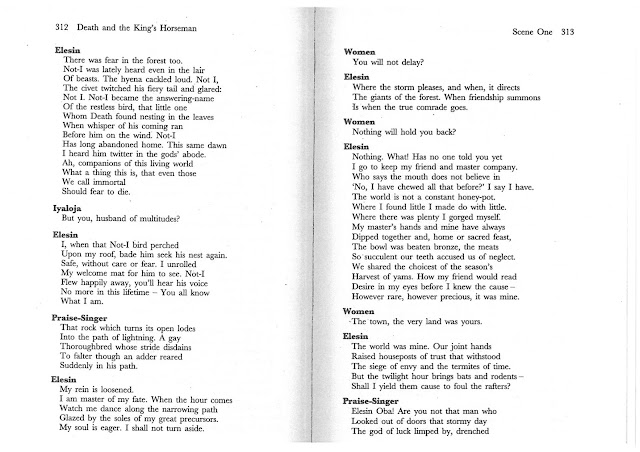I can read the text and make inferences based on what I have read (RL.11-12.1)
I can connect what I know about the author to the choices he made in the text (RL.11-12.3)
I can look at the word choice (diction) used in the text and connect it to the themes shown in the text (RL.11-12.4)
Vocabulary quiz today! Take a couple of minutes to look over the words
Coming Up: Death and the King's Horseman vocabulary 2 (class handout / copy below); quiz on Friday, April 5.
1. raconteur:
A person skilled in telling anecdotes
2. retinue:
The group following and attending to some important person
3. divination:
The art or gift of prophecy by supernatural means
4. veneration:
A feeling of profound respect for someone or something
5. dirge:
a song or hymn of mourning as a memorial to a dead person
6. alari:
a rich, woven cloth, brightly colored
7. egungun:
ancestral masquerade
8. etutu:
placatory rites or medicine
9. tryst:
a private romantic rendezvous between lovers
10. forebears:
an ancestor
11. suppliant:
making a humble plea to someone in power or authority
12. acolyte:
person assisting the celebrant in a religious service or procession
13. hearth:
the floor/front area of a fireplace
*****************************************************************************
Coming up: April 5 vocabulary quiz AND on Monday, April 1, there will be a matching quiz on the characters in the play.
Death And the King’s Horseman Vocabulary
Quiz on April 5th
1. impudent (adjective): improperly forward or bold
2. bereavement: (noun) state of sorrow over the death or
departure of a loved one
3. ostentatious: (adjective) intended to attract notice and
impress others
4. dearth: (noun) an insufficient quantity or number
5. to usurp: (verb) seize and take control without authority
6. redolent: (adjective) serving to bring to mind
7. to prostrate: (verb) render helpless or defenseless
8. gbedu: (noun) a deep-timbered royal drum
9. opele: (noun) string of beads used in Ifa divination
10.robo: (noun) a delicacy made from crushed melon seeds,
fried in tiny balls
*********************************************************************************
Today we start the play. Posted below is a copy of the play and a link to a pdf copy of the play as well. We will start by reading the first three pages of the play.
Pronunciation guide
Characters:
Elesin Oba ay-LAY-sihn OH-bah
Iyaloja ee-yah-LOH-jah
Sergeant Amusa ah-MEW-sah
Olunde oh-LEWN-day
Simon Pilkings
Jane Pilkings
Death And The King's Horseman Play
https://www.uibk.ac.at/anglistik/staff/davis/death-and-the-king-s-horseman---wole-soyinka.pdf
Quiz on April 5th
1. impudent (adjective): improperly forward or bold
2. bereavement: (noun) state of sorrow over the death or
departure of a loved one
3. ostentatious: (adjective) intended to attract notice and
impress others
4. dearth: (noun) an insufficient quantity or number
5. to usurp: (verb) seize and take control without authority
6. redolent: (adjective) serving to bring to mind
7. to prostrate: (verb) render helpless or defenseless
8. gbedu: (noun) a deep-timbered royal drum
9. opele: (noun) string of beads used in Ifa divination
10.robo: (noun) a delicacy made from crushed melon seeds,
fried in tiny balls
*********************************************************************************
Today we start the play. Posted below is a copy of the play and a link to a pdf copy of the play as well. We will start by reading the first three pages of the play.
Pronunciation guide
Characters:
Elesin Oba ay-LAY-sihn OH-bah
Iyaloja ee-yah-LOH-jah
Sergeant Amusa ah-MEW-sah
Olunde oh-LEWN-day
Simon Pilkings
Jane Pilkings
Death And The King's Horseman Play
https://www.uibk.ac.at/anglistik/staff/davis/death-and-the-king-s-horseman---wole-soyinka.pdf


















































